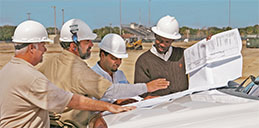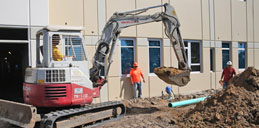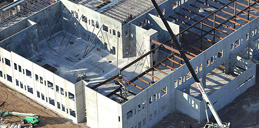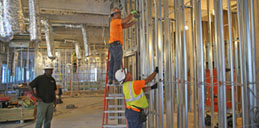Techniques Your Construction Company Can Use to Make Your Building More Energy Efficient
There’s more focus on energy efficiency than ever. Whether you’re building a home or commercial property, project managers and contractors use new technologies to reduce a structure’s environmental impact and boost energy efficiency. In this post, we look at how they accomplish this while keeping the comfort and well-being of the occupants in mind.
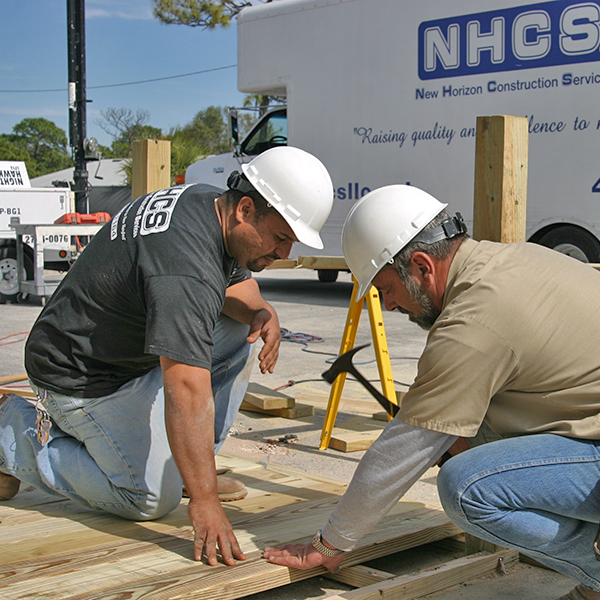 Optimizing Space
Optimizing Space
Today’s trend is to build up instead of out to optimize space. Building up maximizes energy efficiency by reducing material waste and electricity usage. Taller, narrower structures also allow easier indoor temperature regulation and increased efficiency of the building’s HVAC system.
Modular Construction
Another technique that’s growing more popular is modular construction. This off-site building method reduces material waste and uses less energy because you can develop multiple projects in one location. Research shows that modularly designed buildings are more energy efficient because of improved sealing, keeping hot and cold air inside.
Improved Weatherization
Heat and cooling loss is a significant contributor to a building’s inefficiency. Hot and cold air escape through cracks and gaps, particularly around doors or windows. Applying weatherstripping to door and window frames, contractors make a tighter seal, keeping hot and cold air in and taking some load off the HVAC system.
Smart Technology Integration
Smart technology is significantly impacting residential and commercial construction, particularly using smart thermostats and smart lighting systems.
Smart Thermostats
Smart thermostats significantly improve HVAC efficiency and decrease utility costs. These devices connect the system with the internet to gather weather data and adjust internal temperatures based on the information. Moreover, homeowners and property managers can schedule when the system kicks on and off, giving them greater control over their energy expenses.
Smart Lighting
Like smart thermostats, smart lighting systems give people more control over their energy expenses. Smart lighting systems connect to motion sensors to automatically turn on and off, saving energy. And like smart thermostats, some lighting systems can be controlled through your wireless network via a phone or tablet. Combining smart lighting systems with energy-efficient LED bulbs can produce significant energy savings.
Using Natural Light
Speaking of lighting systems, one of the best ways to make a building more energy efficient is to design it to take advantage of natural light as much as possible. Designers and construction companies achieve this by using skylights and plenty of south-facing and solar windows. Solar windows are relatively new in construction, using transparent solar cells to convert natural sunlight into emission-free energy while still taking advantage of natural light.
Energy-Efficient HVAC Systems
Much is being done to reduce the workload of a building’s HVAC system, but these systems still consume a lot of energy. High-efficiency HVAC systems that use variable speed compressors and advanced control systems can adapt to changing conditions and maintain optimal performance, resulting in lower energy consumption and increased comfort.
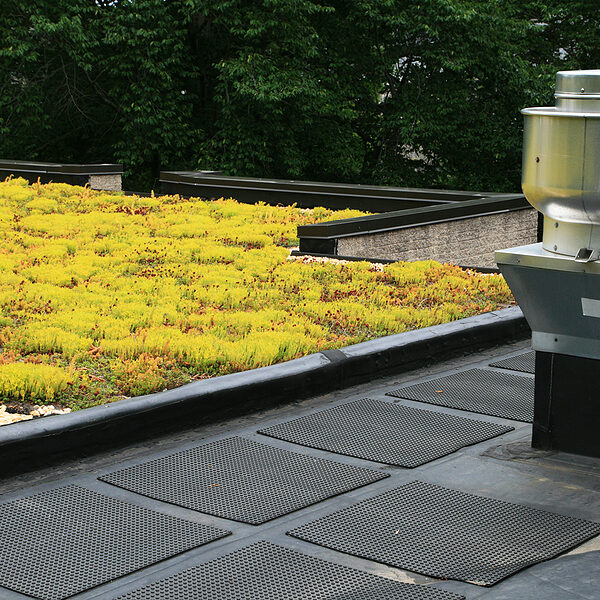 Green Roofs & Cool Roofs
Green Roofs & Cool Roofs
Finally, green and cool roofs are other innovative energy-saving solutions used in more and more commercial spaces. According to EnergyStar.gov, A green roof, or rooftop garden, is a layer of vegetation growing on a rooftop. Green roofs provide shade and remove heat from the air to reduce temperatures on the surface, thus moderating the heat island effect.
A cool roof is another option to reduce the effects of a heat island. Cool roofs are made from reflective materials that remain cooler than traditional roofing materials during peak temperatures. While these roofing systems cost more than a conventional roof, they last longer and are more energy efficient, so you actually save money in the long run.
If you’re starting a new building project and want to make it as energy efficient as possible, contact us for a consultation at 407–574–2164 or reach us online.


